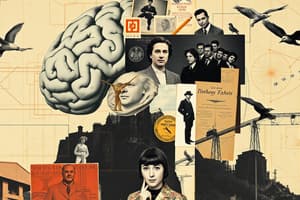Podcast
Questions and Answers
Which statement best describes the scope of psychology?
Which statement best describes the scope of psychology?
- The study of mental disorders and their treatment.
- The scientific study of mind and behavior, encompassing a wide range of topics and drawing on various disciplines. (correct)
- The analysis of social structures and their impact on human societies.
- The philosophical exploration of consciousness and existence.
Which early school of thought in psychology focused on analyzing the basic elements of consciousness?
Which early school of thought in psychology focused on analyzing the basic elements of consciousness?
- Structuralism (correct)
- Gestalt psychology
- Functionalism
- Behaviorism
Which perspective emphasizes the role of learning and environmental factors in shaping behavior?
Which perspective emphasizes the role of learning and environmental factors in shaping behavior?
- Cognitive perspective
- Behavioral perspective (correct)
- Biological perspective
- Psychodynamic perspective
Which perspective explores the influence of unconscious drives and conflicts on behavior?
Which perspective explores the influence of unconscious drives and conflicts on behavior?
A psychologist is studying how cultural norms affect expressions of emotion. Which perspective are they likely using?
A psychologist is studying how cultural norms affect expressions of emotion. Which perspective are they likely using?
If a psychologist is interested in understanding how people solve problems and make decisions, which perspective is most relevant?
If a psychologist is interested in understanding how people solve problems and make decisions, which perspective is most relevant?
Which approach to psychology emphasizes personal growth and the realization of one's full potential?
Which approach to psychology emphasizes personal growth and the realization of one's full potential?
If a researcher is studying how neurotransmitters in the brain influence mood, which psychological perspective are they using?
If a researcher is studying how neurotransmitters in the brain influence mood, which psychological perspective are they using?
Which research method is MOST suitable for establishing a cause-and-effect relationship between two variables?
Which research method is MOST suitable for establishing a cause-and-effect relationship between two variables?
What is the PRIMARY goal of descriptive research methods in psychology?
What is the PRIMARY goal of descriptive research methods in psychology?
A researcher observes a strong positive correlation between hours of sleep and exam scores. What can they conclude?
A researcher observes a strong positive correlation between hours of sleep and exam scores. What can they conclude?
Which of the following is a CORE ethical consideration in psychological research?
Which of the following is a CORE ethical consideration in psychological research?
Which concept BEST describes an individual's awareness of their own thoughts, feelings, and surroundings?
Which concept BEST describes an individual's awareness of their own thoughts, feelings, and surroundings?
What distinguishes operant conditioning from other forms of learning?
What distinguishes operant conditioning from other forms of learning?
Which aspect of emotion involves physiological responses such as changes in heart rate or skin conductance?
Which aspect of emotion involves physiological responses such as changes in heart rate or skin conductance?
In which applied psychology field would a psychologist MOST likely work to improve employee morale and productivity?
In which applied psychology field would a psychologist MOST likely work to improve employee morale and productivity?
Flashcards
Descriptive methods
Descriptive methods
Research methods that systematically gather information about behavior, including observation and surveys.
Correlational methods
Correlational methods
Methods that examine relationships between two or more variables but do not show causation.
Experimental methods
Experimental methods
Research involving manipulation of an independent variable to observe effects on a dependent variable, aiming to establish cause and effect.
Ethical considerations
Ethical considerations
Signup and view all the flashcards
Consciousness
Consciousness
Signup and view all the flashcards
Memory
Memory
Signup and view all the flashcards
Psychological disorders
Psychological disorders
Signup and view all the flashcards
Applied psychology
Applied psychology
Signup and view all the flashcards
Psychology
Psychology
Signup and view all the flashcards
Structuralism
Structuralism
Signup and view all the flashcards
Functionalism
Functionalism
Signup and view all the flashcards
Gestalt Psychology
Gestalt Psychology
Signup and view all the flashcards
Biological Perspective
Biological Perspective
Signup and view all the flashcards
Cognitive Perspective
Cognitive Perspective
Signup and view all the flashcards
Behavioral Perspective
Behavioral Perspective
Signup and view all the flashcards
Humanistic Perspective
Humanistic Perspective
Signup and view all the flashcards
Study Notes
Introduction to Psychology
- Psychology is the scientific study of mind and behavior.
- It encompasses a wide range of topics, from basic processes like perception and memory to complex phenomena like social interactions and mental health.
- Psychology draws on various disciplines, including biology, sociology, and philosophy, to understand the human experience.
- Psychology utilizes scientific methods to investigate questions about the mind and behavior, including experiments, observations, and surveys.
- The field of psychology is constantly evolving as new research and theories emerge.
History of Psychology
- Early schools of thought include structuralism (focused on analyzing the basic elements of consciousness), functionalism (examining the purpose of mental processes), and Gestalt psychology (emphasizing the importance of perceiving the whole rather than parts).
- Significant figures like Wilhelm Wundt are credited with establishing psychology as a separate scientific discipline.
- Different schools of thought emerged, emphasizing different aspects of human behavior and mental processes.
- Modern psychology synthesizes these different schools of thought to offer a more comprehensive perspective.
Major Perspectives in Psychology
- Biological perspective: Examines the influence of genetics, neurochemicals, and brain structures on behavior and mental processes. Biological factors underpin psychological experiences.
- Cognitive perspective: Focuses on mental processes such as thinking, memory, problem-solving, and language. It explores the connections between the mind and behavior.
- Behavioral perspective: Emphasizes the role of learning and environmental factors in shaping behavior. This approach studies how behavior is acquired and modified through learning.
- Psychodynamic perspective: Explores the influence of unconscious drives, conflicts, and early childhood experiences on behavior and mental processes. This perspective focuses on how underlying conflicts shape present behavior.
- Humanistic perspective: Highlights the importance of personal growth, free will, and self-actualization. Humanistic psychology emphasizes a positive approach to understanding motivation and well-being.
- Sociocultural perspective: Examines the impact of social and cultural factors on behavior and mental processes. Considerations of cultural norms and societal influences shape behaviors.
Research Methods in Psychology
- Descriptive methods: Include naturalistic observation, case studies, and surveys. These are used to systematically gather information about behavior.
- Correlational methods: Examine the relationship between two or more variables. Correlations do not infer causality.
- Experimental methods: Involve manipulating one variable (the independent variable) to observe its effect on another variable (the dependent variable). Experiments aim to establish cause-and-effect relationships.
- Ethical considerations in psychological research are paramount. Protecting participants' rights, informed consent, and confidentiality are crucial aspects of ethical research.
Key Concepts in Psychology
- Consciousness: The awareness of internal and external stimuli. Consciousness is an ongoing process, which is subjective and influenced by our thoughts and feelings.
- Memory: The cognitive process involved in encoding, storing, and retrieving information. Memory is essential for learning and adaptation.
- Learning: The process by which experience modifies behavior and knowledge. Learning occurs through various mechanisms, including classical and operant conditioning.
- Motivation: The internal processes that initiate, guide, and maintain behavior. Different motivational theories explain the "why" behind actions.
- Emotion: Subjective feelings associated with physiological responses and behavior. Emotions are complex and involve both cognitive and environmental influences.
Psychological Disorders
- Psychological disorders are patterns of behavior or experience that cause distress, impairment in functioning, or a risk of suffering.
- They are characterized by a range of symptoms that vary depending on the specific disorder.
- Diagnosing and treating psychological disorders involve using various approaches, including pharmacological therapies and psychotherapy.
- Mental health conditions require professional assessment and intervention.
Applied Psychology
- Psychology is applied in various fields such as education (educational psychology), business (organizational psychology), and clinical practice (clinical psychology).
- Applied psychologists use psychological knowledge to address real-world problems and improve lives.
- Psychological principles and research are increasingly important in diverse areas.
Studying That Suits You
Use AI to generate personalized quizzes and flashcards to suit your learning preferences.




